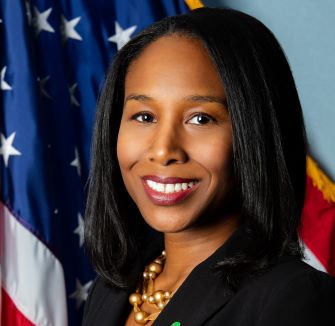Prioritizing Mental Well-Being: A Crucial Call to Support Our First Responders
February 02, 2024 Charlotte Nwogwugwu
A program in Hyattsville, Md., mandates quarterly one-on-one sessions between each police department member and mental health professionals.
Photo: Adrienne Augustus, mental health programs manager of the Hyattsville Police Department, the brain behind this innovative initiative
In recent years, the focus on mental health within the context of first responders has gained well-deserved attention. These individuals, often the unsung heroes in emergencies, face unique challenges that can have profound effects on their mental well-being. It is imperative to shed light on the importance of prioritizing mental health among first responders.
The demanding nature of the roles undertaken by first responders places them at the forefront of critical incidents, where they routinely face highly stressful and traumatic situations. Police officers, firefighters, and emergency medical personnel are often exposed to scenes of accidents, disasters, violence, and life-threatening emergencies, all of which can have a profound impact on their mental health.
The cumulative effect of repeated exposure to these high-stress situations cannot be understated. Over time, the emotional toll exacted on first responders may manifest as mental health challenges, with post-traumatic stress disorder (PTSD), anxiety, and depression being among the most prevalent issues. PTSD, in particular, can arise as a result of experiencing or witnessing traumatic events, leading to persistent distressing thoughts, nightmares, and heightened reactions.
The unique and unpredictable nature of their work means that first responders are continually navigating a landscape where their own safety and the safety of others hang in the balance. The constant exposure to life-and-death situations, coupled with the pressure to make split-second decisions, can contribute to heightened levels of stress and anxiety. Moreover, the emotional toll of witnessing human suffering and loss can take a toll on their mental well-being, leading to a range of mental health challenges.
Recognizing and addressing these issues is paramount for the overall well-being of those who dedicate their lives to serving and protecting our communities. Failure to acknowledge the mental health implications of their work not only jeopardizes the individual first responder's health but also can compromise their ability to perform optimally in high-pressure situations. Unaddressed mental health challenges may lead to burnout and decreased job satisfaction, and, in extreme cases, they can impact the overall effectiveness of emergency response systems.
To address this, the Hyattsville Police Department (HPD) in Prince George’s County, Md., implemented a program mandating quarterly one-on-one sessions between each department member and mental health professionals. This initiative has witnessed notable success in terms of participation, with members recognizing its positive impact on reducing stigma within the community.
In an interview between Charlotte Nwogwugwu, DrPH, BSN, RN, HIV PCP, CPH-BC, interim director of the Office of Global Health at the University of Maryland School of Nursing, and Adrienne Augustus, mental health programs manager, HPD, the brain behind this innovative initiative, Augustus had the following to say:
“This is the Mental Wellness Check-In Initiative [MWCI], but we are not just checking a box. This program provides meaningful interactions between first responders and mental health professionals while eliminating the stigma attached to seeing a therapist.
“I wanted to open the door to better mental wellness for some of the people in our community who need it most. Law enforcement officers and dispatchers experience unimaginable trauma and vicarious trauma from the simple nature of their job. I had an idea, but I knew it had to meet the unique needs of the officers and dispatchers at the Hyattsville Police Department — the culture, size, and demographics. What we did is working, but it doesn't have to start and stop with small municipal agencies. I believe the MWCI can also work at larger organizations. The key is recognizing that the MWCI is not a one-size-fits-all program. We established a framework by examining the department’s operational structure and then built a blueprint that works for it. We launched it all at one time for both HPD and [nearby] Brentwood PD. That doesn’t have to be the case at larger agencies. I hope more law enforcement leadership across the country will take a significant step toward supporting their people’s mental health and look for ways to establish programs similar to the MWCI.
“You can meet the minimum standards set by policy or law, or you can take steps to make real, meaningful change that helps everyone. In 2021, leaders in Hyattsville and Brentwood took those steps to support their first responders’ mental health in a meaningful way. I hope more agencies across the country do the same because the ripple effects are exponential. When someone is mentally well, they can have better relationships personally and professionally. That is especially important for law enforcement. The MWCI supports the police and, consequently, the community they serve.”
This offers a unique chance for our community to unite and explore ways to support those who serve and protect us. It prompts us to reflect on how we can actively engage and demonstrate our support.
For more information on this program, please contact augustus.adrienne@gmail.com or call 702-203-7363.